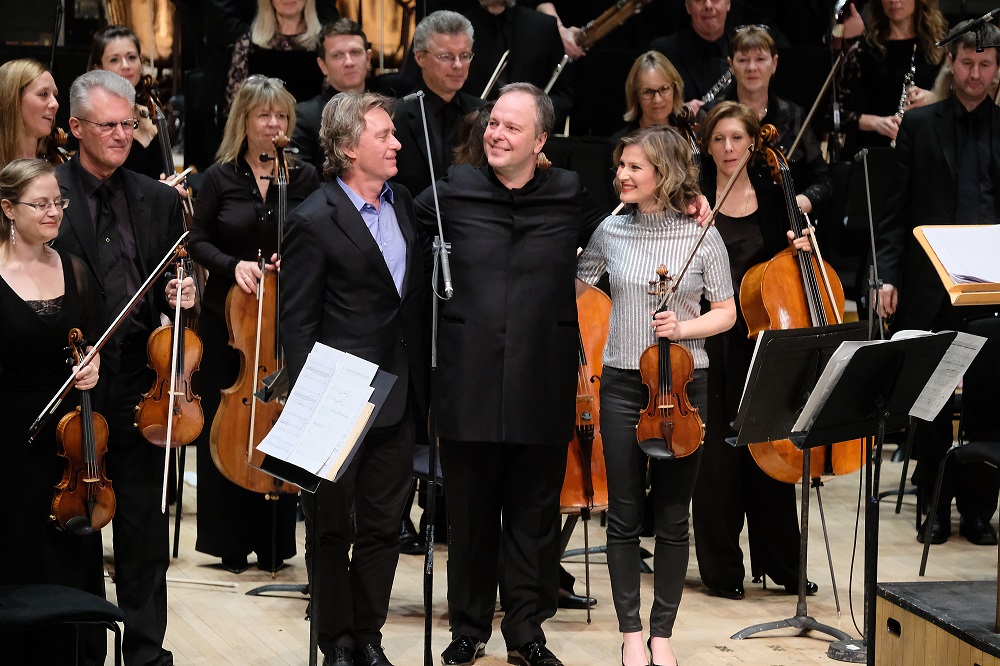Expectations ran high for Mark Padmore and Mitsuko Uchida in Winterreise.

The Chineke! Orchestra has won golden opinions for its ground-breaking work and musical achievement, and Manchester caught up to the extent of a visit from the eight-person Chineke! Ensemble to the Royal Northern College of Music.

After Sakari Oramo's dazzling Sibelius rattlebag with the BBC Symphony Orchestra on the centenary day of Finnish independence, things weren't looking so good for Esa-Pekka Salonen and the Philharmonia at half time last Thursday (★★★). Then along came the Four Lemminkäinen Legends, an early Sibelius masterpiece teeming with invention and strangeness, long a Salonen speciality.

Shostakovich’s First Violin Concerto is a big work in every sense: four movements, plus a solo cadenza before the last one that makes it seem almost like five; a soloist’s role that even David Oistrakh (for whom it was first written) found taxing; symphonic construction and instrumentation which make the orchestral contribution at least as important as the solo one.

As the Parliament of the Autonomous Grand Duchy of Finland within the Russian Empire declared independence on 6 December 1917, Sibelius had his head down working on the third version of his Fifth Symphony, the one so hugely popular today. He tried to ignore the dark clouds of Russian revolutionary interference in an event he'd anticipated for so long, composing no music of public celebration.


Organ improvisation is a remarkable art, prized in French musical culture particularly, and there was something highly appropriate in the choice of The Phantom of the Opera – a screening of the 1925 silent film with live accompaniment on the RNCM concert hall organ by Darius Battiwalla – as part of the "French Connections" year-long festival at the Manchester conservatoire.
Even given the peerless standards already set by Sakari Oramo and the BBC Symphony Orchestra in their Sibelius cycle, this instalment was always going to be the toughest, featuring the most elusive of the symphonies, the Sixth, and the sparest, the Fourth. As it turned out, all challenges were met with Oramo's characteristic mix of energy and sophistication, and the interloper, Swedish composer Anders Hillborg's Second Violin Concerto in its UK premiere, saw to it that Lisa Batiashvili carried the flame.
Was it going to be generic contemporary? The skeetering strings at the beginning suggested as much. But their headlong collision with a chorus of sustained chords proved arresting: what sounded like a pre-recorded ambience turned out to be those same strings turned to calm seas. In effect much of the one-movement concerto was searing cadenza from the compellingly intense Batiashvili (pictured below with Hillborg, Oramo and members of the BBC Symphony Orchestra by Mark Allen), mostly accompanied until close to the end and punctuated by two wild eastern dances – part Turkish sanat, part Bollywood, with Hillborg making and needing no apologies for the populism.
The intensity held; the ear was led through ever-unexpected harmonic shifts, and where the work might have sagged, the two oboes and cor anglais introduced a mesmerising new hook. Filmic in effect, but never merely film music. Given the echo of Bach's D minor Sarabande near the start, the ethereal encore was entirely appropriate – Hillborg's arrangement for violin and strings of the organ prelude on the chorale "Ich ruf zu Dir".
Though the Fourth could hardly be further away in its slow-evolving dark power, the hallmarks of these interpretations remained: the powerfully-vocalised wind solos (flautist Michael Cox especially impressive), the simultaneous projection of upper, middle and bass layers, all doing their own distinctive thing, and the way Oramo sustains a line or an argument even when it's punctuated by long silences. The high watershed both of Sibelius's unique tragedy among his symphonies and of the playing came in the great slow movement, heroically trying to piece itself together out of numb, depressive fragments. It's the cellos who finally, gradually manage to give full voice to a cathartic lament. That climb of theirs out of the darkness last night will stay with me for ever.
- Listen to this concert for the next month on the BBC iPlayer
- Read more classical reviews on theartsdesk
Next page: watch Lisa Batiashvili with Sakari Oramo conducting the Royal Stockholm Philharmonic in the 2016 premiere of Hillborg's Second Violin Concerto

When you've found your living ideal for Schubert's sonatas - Elisabeth Leonskaja, surely - it can be a challenge to stay open-minded and welcome another take on the profundities.

Reading the line-up for Huddersfield Contemporary Music Festival can be a bit of a //+DiGit<ijjjjjjjjjjjjj.ggiiigggggH1-RMXn4000// experience (and no, I haven’t invented those). There are flashing light warnings. Ear defenders are routinely handed out. The message is clear: prepare for a sonic assault course.

